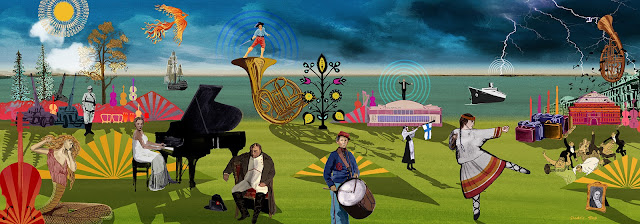For their series Lights in the Dark at the Royal Festival Hall (with two concerts at the Royal Albert Hall), the Royal Philharmonic Orchestra and music director Vasily Petrenko explore the many ways in which composers have responded to the existential threat of war and the suffering unleashed by oppressive regimes. The series opens on 26 January 2025 with Berg’s Three Pieces for Orchestra, Beethoven’s Piano Concerto No.5 ‘Emperor’, with Paul Lewis as soloist, and Stravinsky’s The Rite of Spring. Both Berg and Stravinsky were both booed when these pieces were first played, whilst it is often easy to forget that Beethoven’s concerto was written in the middle of large-scale conflict.
On 23 March, the programme combines three movements from Korngold’s The Sea Hawk Suite, Rachmaninov’s Rhapsody on a Theme of Paganini, with Bruce Liu as soloist, and Bartók’s Concerto for Orchestra. All three composers ended up fleeing their homes because of politics. Rachmaninov fled the Russian Revolution and his Rhapsody reflects his itinerant life as a virtuoso pianist, written in Switzerland, premiered in America and suffused with the Russia that had gone with the Revolution. Korngold travelled to Hollywood at the request of Max Reinhardt to work on the film of A Midsummer Night’s Dream. After a few films, Korngold became disillusioned and planned to return home, but news of the Anschluss meant that Jew, return to Vienna was not possible. Bartók similarly fled Fascism and sought refuge in America but like Rachmaninov, Bartók found his new life a challenge. His Concerto for Orchestra, written at this time, partially reflects this.
Other programmes include Sibelius’s Finlandia, Weill’s Four Walt Whitman Songs, with baritone Roderick Williams, and Shostakovich’s Symphony No.7 ‘Leningrad. Shostakovich’s was written in the middle of Hitler’s siege of Leningrad whilst Sibelius was writing when nascent Finnish nationalism was defying Russian Imperialism. Weill’s Whitman settings represent the exiled composer addressing his new home.
There are also two concerts in the series at the Royal Albert Hall in May. Richard Strauss’ An Alpine Symphony, written in the middle of World War I, is combines with music from another exile, Chopin’s Piano Concerto No. 1, and Mussorgsky’s Pictures at an Exhibition, whilst Strauss’ Don Juan is performed with Sibelius’ Violin Concerto (with Maxim Vengerov) and Stravinsky’s complete Firebird.
The series concludes on 25 June at the Royal Festival Hall with Dorothy Howell’s symphonic poem Lamia, written at the end of the First World War, and the Piano Concerto in One Movement by African-American composer Florence Price, a composer whose success in life was not reflected in her enduring reputation until her more recent discovery. The third work in the programme is Tchaikovsky’s Symphony No.4, a work where we can, perhaps, hear Tchaikovsky trying to come to terms with being an outsider in Russian society.
Full details from the RPO website.










